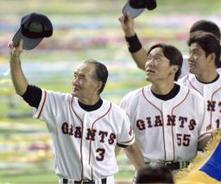 Source: Jomo Shimbun
Source: Jomo Shimbun For example, following criticism of the manner the DPJ government had handled the nuclear crisis at the Fukushima Daiichi power plant, the victory of the Japanese women’s soccer team (“Nadeshiko Japan”) in the Women’s World Cup in August 2011 presented an ideal opportunity to bestow on the team a “People’s Honour Award” (or 国民栄誉賞, despite the fact that such awards had never before been granted to an entire team, and were meant to acknowledge numerous achievements over a lifetime, not a one-off victory).
By ostensibly awarding an honour to “encourage the people” following the March disaster of that year, the DPJ managed to divert attention from the fact that an investigative team from the IAEA had found radiation levels around the No.1 and No.2 reactors at the Daiichi plant at 10 sieverts during the same week (by way of contrast, according to the International Commission on Radiological Protection (ICRP), an acceptable level of artificial irradiation is 1 micro sievert per annum. 10 sieverts is the equivalent of 10,000 micro sieverts) (上杉隆、国家の恥:一億総洗脳化の真実、ビジネス社、東京、2012年, pp.88-89).
Considering the nature of these awards, and the fact that they can be bestowed by the government at its leisure to any Japanese citizen, the timing of the announcement of such awards and their intended recipients has become as much a talking point as the award itself. The announcement on Wednesday this week (Link – J) that former Yomiuri Giants players Nagashima Shigeo and Matsui Hideki would be granted such an honour provoked speculation regarding just why the Abe government had chosen now to make the announcement, less than six months out from the House of Councillors election, and why it had chosen Nagashima and Matsui in particular.
Asakawa Hirotada (Link-J) was one of the first to wade into the debate, noting that Nagashima (77 years of age) was of the same age as a majority of Japan’s pensioners, who would have fond memories of Nagashima during his playing days (and who make up a majority of the voting base in Japan). As for Matsui, although he has only just retired aged 38, his record with the New York Yankees (including a World Series championship) has been lauded in Japan, particularly among fans of the Yomiuri Giants (who have the largest following among all teams in the Pacific and Central leagues Link- J p.6). Although it seems entirely cynical to suggest that the Abe government is seeking to capture a majority of the vote in the upper house using populist methods, this appears precisely what Abe had in mind in choosing two prominent figures that appeal to a majority of voters before the upper house election (note the 35-70 age bracket and the increase in voter participation among such demographics here – p.8).
As an aside, the Sankei Shimbun also reported on the curious manner in which the media got hold of the news of the announcement of Nagashima’s selection for an award (Link – J). Rather than it being reported by the Yomiuri Shimbun (owner of the Giants baseball club, and whom you would expect to obtain such a scoop), that distinction went to the local Gunma prefectural newspaper the Jomo Shimbun, which broke the news on Monday before any major papers (Link-J). What makes this even more curious is that Nagashima is not from Gunma prefecture, therefore leading to speculation that the news was leaked to the Jomo Shimbun by someone within the Abe Cabinet with ties to Gunma.
So far, the most likely culprit appears to be Minister for Okinawan and Northern Territories Issues Yamamoto Ichita, a Gunma-ite through and through. Though Yamamoto protested his innocence (Link-J), the circumstances that led to the Jomo Shimbun reporting on the decision appear too unusual to rule out a leak. A regional paper scooping a nationally syndicated paper (with direct ties to the person being honoured)? Once in a blue moon perhaps, but the fact that the Jomo Shimbun didn’t note any particular access to inside information or sources makes the whole situation very odd indeed.
Of course, none of this is to detract from the award itself or its recipients, who certainly deserve recognition of their achievements. When the award process becomes politicised, however, it reflects badly on the selection process and the motives of the government. Perhaps Asakawa is right in suggesting the creation of legislation that would ban the issuing of such awards six months out from any sort of federal election.
 RSS Feed
RSS Feed